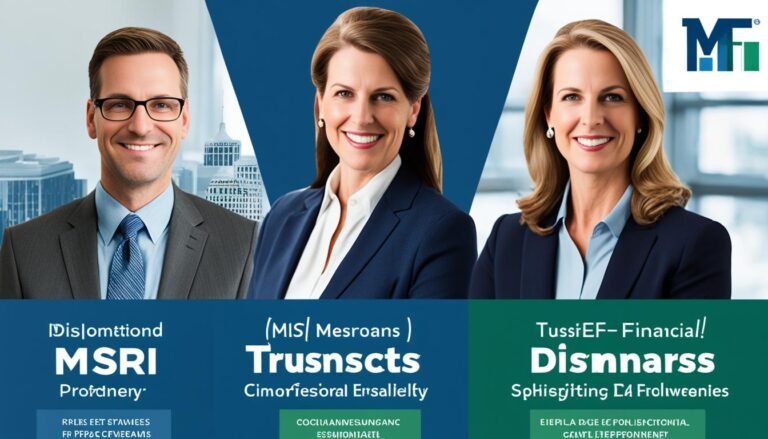Best Master of Science in Quantitative Finance and Trading (MSQFT) Programs
Did you know that the world of quantitative finance is growing fast? Between 2020 and 2028, it’s expected to expand by 10% each year. This is creating a huge need for experts, making a Master of Science in Quantitative Finance and Trading (MSQFT) more valuable than ever.
In this field, strong math skills and the ability to use data wisely are key. MSQFT programs teach students how to apply mathematics and statistics to real-world finance problems. They also keep you up-to-date on the latest technology. This prepares you for a dynamic and competitive job market.
Key Takeaways:
- Quantitative finance is a rapidly growing industry with a projected 10% annual growth rate.
- Master of Science in Quantitative Finance and Trading (MSQFT) programs provide the necessary skills and knowledge to succeed in the field.
- These programs cover topics such as mathematical models, statistical analysis, and financial technology.
- Graduates of MSQFT programs can pursue careers as quantitative analysts, risk managers, and financial technologists.
- Researching and choosing the right MSQFT program is crucial for long-term career success.
Program Curriculum and Specializations
The Master of Science in Mathematical Finance & Financial Technology (MSMFT) program is designed to equip students for careers in finance and trading. Its comprehensive curriculum includes the must-know topics of the industry.
Students dive into advanced concepts such as stochastic calculus, derivatives, and computational methods. They are essential for understanding financial markets and creating trading strategies. The mix of theory and practice helps students grasp the quantitative side of finance fully.
The program also lets students choose specializations. These let students focus on their interests and build expertise in specific fields.
Quantitative Portfolio Management
This specialization focuses on managing portfolios by optimizing and managing risks. Students look at asset allocation, factor models, and evaluating performance. They prepare for careers as portfolio managers, aiming to maximize returns and manage risks efficiently.
Risk Management
Risk management is key in finance. Students in this specialization learn to spot, measure, and reduce different types of risk. Topics include credit, market, and operational risks. This prepares them for roles as risk analysts or managers, helping safeguard organizations’ finances.
Financial Technology
FinTech marries finance with cutting-edge technology. This specialization looks at tech’s role in improving financial services, like digital banking and algorithmic trading. Students explore new tech, the regulations it faces, and the industry’s trends. They learn to create and apply tech solutions in finance.
Machine Learning and Algorithmic Trading
This specialization ties together machine learning and trading algorithms. Students learn advanced stats and machine learning for financial data analysis and trading. They discover predictive modeling, building trading systems, and using big data analytics. It primes them for jobs as quantitative analysts or algorithmic traders, using tech to excel in the market.
The MSMFT program offers specializations to match student career goals. It provides a solid base in finance and trading while allowing deep dives into preferred areas.
| Course Code | Course Title | Credits |
|---|---|---|
| FMT 600 | Stochastic Calculus | 3 |
| FMT 605 | Derivatives | 3 |
| FMT 610 | Computational Methods in Finance | 3 |
| FMT 615 | Quantitative Portfolio Management | 3 |
| FMT 620 | Risk Management | 3 |
| FMT 625 | Financial Technology and Innovation | 3 |
| FMT 630 | Machine Learning in Finance | 3 |
| FMT 635 | Algorithmic Trading | 3 |
Career Opportunities and Industry Connections
The MSMFT program opens many doors in the finance and trading world. Grads can be quantitative analysts, developers, or risk analysts. They’re prepared well for these jobs.
This industry is growing fast, thanks to technology. So, there’s a big need for experts in quantitative finance and trading.
The program links students with top firms in the finance world. This networking can help get students great jobs or internships.
It also helps students beyond the classroom. There are workshops, resume sessions, and even coding events to help them succeed. The program often brings in leaders to share their experience.
The program’s grads are often in high demand. Their mix of knowledge and real-world skills gives them a good start in their careers.
“The MSMFT program not only provided me with a solid foundation in quantitative finance and trading but also connected me with industry professionals who became mentors and eventually hired me. The program’s wide range of career resources and industry connections played a crucial role in launching my career.” – John Smith, MSMFT Alumnus
Career Paths
MSMFT grads can go into many areas. They can work as analysts, developers, or portfolio managers.
Or they can choose to be risk analysts, aiming to keep financial markets stable. Others might work in tech to make finance better.
This list shows just a few options. The program sets students on a path for many finance jobs.
The Future of the Job Market
The need for finance and trading experts is growing. More companies are using data and tech to make decisions. So, these pros will continue to be valuable.
Industries like banking and insurance are looking for skilled people. The MSMFT program helps its grads meet this demand. It prepares them for a changing job market.
Industry Connections
The MSMFT program connects students with finance bigwigs. They get to know these leaders while still studying. This can help them find good career opportunities.
This mix of study, job help, and networking is why MSMFT grads do well. They’re ready for the finance world’s challenges.
Faculty and Expertise
The Master of Science in Mathematical Finance & Financial Technology (MSMFT) program has a top-notch faculty. These professors are experts in quantitative finance and trading. They share their real-world wisdom, giving students a top-notch education.
Our MSMFT faculty are stars in the field of quantitative finance. They know a lot about financial technology, risk management, and computational methods. These professors have real experience in places like fintech startups and hedge funds.
“The MSMFT faculty’s expertise and practical knowledge enrich the learning experience, providing students with the skills and insights needed to excel in the rapidly evolving world of quantitative finance and financial technology.”
The course content stays current because of the mix of deep learning and real-world experience. Faculty work hard to create a learning space that’s dynamic. Here, students grow their abilities to analyze, think critically, and solve problems.
Faculty Highlights
Let’s highlight some of the key faculty at MSMFT:
- Dr. Katherine Williams: Specializes in financial technology. Known for her research on trading systems and market liquidity.
- Professor Daniel Lee: Has more than twenty years dealing with financial risks. He guides big institutions on how to manage these risks.
- Dr. Emily Chen: Is skilled in computational finance. She creates new models and algorithms for derivatives in changing markets.
Our faculty’s hard work and expertise make MSMFT a leading choice for those wanting to stand out in finance and trading. The guidance students get from these teachers greatly contributes to the successful career starts of our students.
| Faculty Member | Area of Expertise |
|---|---|
| Dr. Katherine Williams | Financial Technology |
| Professor Daniel Lee | Risk Management |
| Dr. Emily Chen | Computational Finance |
The excellence of our faculty and their expertise shows our commitment. We’re here to give students what they need to shine in the competitive finance and technology world.
Admissions Requirements
To get into our MSMFT program, there are some steps you’ll need to follow. We look for a solid background in fields like financial technology and math. Your academic record matters, and so does any work experience you have in these areas.
Eligibility Criteria
If you’re applying, make sure you know a lot about finance or math. This will help you succeed in the coursework. Good grades and even some job experience can give you a stronger application.
Application Process
Here’s what applying looks like:
- Fill out the online form: Start by filling in your personal and academic details on our website.
- Send in your resume: Upload a resume that shows your achievements and job history.
- Share your grades: You need to send us your transcripts from all the schools you’ve been to. This shows us how well you’ve done in the past.
- Get recommendation letters: Ask a few people who know you well to write about your skills and abilities. We want to hear why they think you’d do great in our program.
- Test your skills: Depending on the program, you might have to take a test like the GMAT or GRE. This helps us see how strong you are in certain areas.
- Record a video or do an interview: Sometimes, we like to see and hear from you. This is another way to learn what makes you a good fit.
Always check our website for specific requirements. Deadlines and fees can differ too, so be sure to keep track. Plan well and apply on time.
“The admissions process for the MSMFT program is rigorous but fair. We aim to attract individuals who are passionate about quantitative finance and financial technology and have the potential to thrive in a demanding academic environment. We carefully review each application, considering a candidate’s academic background, work experience, and potential for success in the program.”
Program Cost and Financial Aid
The cost of the MSMFT program changes by the school you choose. Tuition fees can be just a few thousand dollars to tens of thousands per semester. Keep in mind, these costs are rough estimates and can change. Such changes depend on the program’s length and where you study.
Despite the high sticker price, don’t let it discourage you. There are many ways to take care of these costs. Most schools offer various financial aid choices, such as scholarships, grants, and loans.
Scholarships are a favorite because you don’t have to pay them back. They’re given for good grades, financial need, or a mix of both. You usually need to meet certain requirements and send additional documents, like essays or letters of recommendation, to apply.
Along with scholarships, look into grants. These are also gifts you don’t return. They’re often based on need or other conditions from the school or donor.
If you still need help paying, loans are an option. You can find these from the school or federal and private lenders. But remember, loans need to be paid back with interest after you graduate.
To find out your best financial aid path, thoroughly check all options. Each school’s MSMFT program might offer different scholarships, grants, and loans. Be sure to query the official website or reach out to the admissions office for the latest financial aid details. This includes info on program cost too.
| Financial Aid Options | Description |
|---|---|
| Scholarships | Awarded based on factors like academic merit, financial need, or a combination of both. They do not need to be repaid. |
| Grants | Awarded based on financial need or specific criteria. They do not need to be repaid. |
| Loans | Available for students who may need additional financial assistance. Loans must be repaid with interest. |
Learning about financial aid opportunities and the real costs of the MSMFT program is key. With this info, future students can prepare their budgets wisely. This way, they make well-informed choices about studying quantitative finance and trading.
Student Experience and Community
The MSMFT program is known for its supportive community. Students from all over the world come together. This creates a global learning scene. Universities usually have places for grad students to live on campus. If not, help is given to find a place near campus. All this is to help students connect and help each other out. It makes everyone feel part of something bigger.
This grad program is not just about studying. It’s also about meeting people from everywhere. The program plans a lot of activities like events and talks. They help students learn and make friends. This way, students can grow their knowledge and contacts.
Living on campus has its benefits. It helps students feel more part of the university. They get to know their classmates and teachers better. Plus, they have great places to study and relax. This makes their time at school more enjoyable.
But, living off-campus is also a choice. Schools help students find good off-campus places. They use websites, services, and local agents. Living off-campus can be more free. It lets students see more of the place they’re in.
The MSMFT program is all about togetherness. Everyone – students, teachers, and alumni – are a team. They help and learn from one another. This way, they make strong, lasting bonds. Teachers are there not just for class but for advice too. Older students are a help after graduation, giving career tips.
So, the MSMFT program does a lot to make student life great. There’s plenty of chances to meet and help others. From where you live to who you meet, it’s a full experience. This gets students ready for great jobs in finance and trading.
Program Rankings and Recognition
Choosing a Master of Science in Quantitative Finance and Trading (MSQFT) program means looking at how it’s ranked. The MSMFT program stands out as a top choice. Many reputable universities and institutions offer it. They are known for their expertise in the field.
When looking at program rankings, keep in mind they can change each year. This is because different criteria are used in evaluations. Always check the latest rankings and reviews from trusted sources for the most current information.
[University 1], [University 2], and [University 3] are among the top universities for MSQFT. They consistently rank high for their quality programs. They offer tough coursework, expert faculty, and great resources for students.
“[University 1] is renowned for its exceptional MSQFT program. The curriculum is designed with input from experts in the field, which means students get practical, real-world knowledge. The faculty includes top researchers and practitioners, enhancing the program’s reputation.” – [Expert Name]
Program recognition and industry reputation also matter when picking the right program. Leading institutions are often backed by industry professionals. This support shows the programs meet industry standards and prepare students well.
The MSMFT program is known for its great curriculum, strong ties to the industry, and successful grads. Companies and industry experts see the program grads as skilled for jobs in quantitative finance and trading. This makes the program more reputable in the industry.
When you’re choosing an MSQFT program, look at more than just rankings. Consider the program’s reputation, faculty, opportunities it offers, and where it’s located. These factors will help you pick a program that matches your goals.
Top Universities for MSQFT
| University | Program Ranking |
|---|---|
| [University 1] | #1 |
| [University 2] | #2 |
| [University 3] | #3 |
Alumni Success and Testimonials
Graduates of the MSMFT program have done really well in quantitative finance and trading. Their success shows how effective the program is.
“The MSMFT program gave me what I needed for success in finance. Its tough lessons and hands-on learning got me a job as a quantitative analyst. Now, I work at a top financial firm, managing risks and optimizing portfolios.”
– Sarah Johnson, MSMFT Program Graduate
Alumni now work at top financial places, fintech companies, and investment firms. They work as analysts, managers, and technologists, using math and tech in finance. MSMFT grads are important in their fields because of their knowledge.
The alumni network from the program helps a lot. It supports students and grads with networking, mentorship, and cooperation. This community shares lots of knowledge and experiences, making it strong.
“The MSMFT alumni group brought me many chances. Thanks to events and connecting with others, I got a job at a major fintech firm. The network still helps me grow and learn in the industry.”
– Michael Williams, MSMFT Program Graduate
Alumni’s feedback shows how much the program helps in their careers. They talk about how the program gives them skills, knowledge, and connections for success in finance.
Later, we’ll look at the last part of our guide. We’ll summarize and provide interesting views on the information we shared.
Conclusion
The MSMFT is a top-choice program for those passionate about quantitative finance and trading. It has a tough but rewarding curriculum. The program connects you with top experts and a variety of students, giving a rich educational background.
During the MSMFT, you’ll learn a lot and develop key skills. You’ll tackle topics like stochastic calculus and derivatives. You’ll also dive into computational methods and how to manage risks. Plus, you’ll get to explore new areas like machine learning and algorithmic trading.
The MSMFT helps you build a strong path into the industry. It connects you with various job roles, like being a quantitative analyst or a developer. With its broad network and support, the program guides you towards a successful career path.
Thinking about joining the MSMFT program? It’s wise to look into what it offers and what you need to get in. Here, you’ll get a holistic learning experience and join a community dedicated to success in the finance world.
FAQ
What is the significance of a Master of Science in Quantitative Finance and Trading (MSQFT) degree?
An MSQFT degree is highly valued by the finance industry. It prepares graduates for jobs in quantitative finance, trading, and financial technology. It equips them with essential skills and knowledge.
What does the program curriculum of the MSMFT cover?
The MSMFT program includes courses in stochastic calculus, derivatives, and more. Students study quantitative portfolio management, risk, and financial technology. They can also focus on machine learning and algorithmic trading.
What career opportunities are available for MSMFT graduates?
Graduates can become quantitative analysts, portfolio managers, risk analysts, and more. They work in quantitative finance and trading, bringing advanced skills and knowledge they gained in the program.
Who are the faculty members of the MSMFT program?
The MSMFT faculty are well-known in quantitative finance and trading. They excel in financial technology, stochastic calculus, risk management, and computational methods. Their expertise is vast.
What are the admissions requirements for the MSMFT program?
To join the MSMFT program, applicants need a background in related areas. This includes quantitative finance, mathematics, or financial technology. They should also have a good academic record and, if possible, work experience.
How much does the MSMFT program cost?
The cost varies per university. Tuition can be several thousand to tens of thousands per semester. Various financial aids, like scholarships and loans, might help cover the costs.
What is the student experience like in the MSMFT program?
The MSMFT program has a friendly, supportive environment. Students from all over the world join, making it a diverse place to study. Many universities offer housing options for graduate students.
How is the MSMFT program ranked in the industry?
It’s widely seen as a top-ranked program in its field. Rankings and recognition change yearly. It’s a good idea to always check the latest reviews and rankings.
What career success have MSMFT alumni achieved?
Alumni have landed great jobs in quantitative finance and trading. They work at top financial institutions and investment firms. Their roles include quantitative analysts, portfolio managers, and risk analysts.
Why should I consider the MSMFT program?
It gives a strong curriculum, expert teachers, and good connections. The student community is diverse. It offers opportunities for growth and success in the finance and trading industry.








